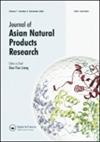枸杞多糖调节肠道微生物群,从而调节高脂饮食诱导的肥胖大鼠体内的代谢物。
IF 1.3
3区 医学
Q3 CHEMISTRY, APPLIED
引用次数: 0
摘要
枸杞多糖对总胆固醇、甘油三酯和高密度脂蛋白等血脂指标有益处,并能提高固醇菌的水平,增加肠道微生物群的多样性,减少代谢紊乱,最终缓解肥胖大鼠的体重增加。但它无法逆转肥胖的结果。枸杞多糖改变了 30 多种不同的代谢物和四种途径。本文章由计算机程序翻译,如有差异,请以英文原文为准。
Lycium barbarum polysaccharides regulate the gut microbiota to modulate metabolites in high-fat diet-induced obese rats
Lycium Barbarum Polysaccharides (LBP) can benefit lipid parameters such as total cholesterol, triglyceride, and high-density lipoprotein levels and upregulate the level of Firmicutes, increase the diversity of gut microbiota and reduce metabolic disorders, finally relieving weight gain of obese rats. But it cannot reverse the outcome of obesity. Over 30 differential metabolites and four pathways are altered by LBP.
求助全文
通过发布文献求助,成功后即可免费获取论文全文。
去求助
来源期刊
CiteScore
3.20
自引率
5.90%
发文量
47
审稿时长
2.3 months
期刊介绍:
The Journal of Asian Natural Products Research (JANPR) publishes chemical and pharmaceutical studies in the English language in the field of natural product research on Asian ethnic medicine. The journal publishes work from scientists in Asian countries, e.g. China, Japan, Korea and India, including contributions from other countries concerning natural products of Asia. The journal is chemistry-orientated. Major fields covered are: isolation and structural elucidation of natural constituents (including those for non-medical uses), synthesis and transformation (including biosynthesis and biotransformation) of natural products, pharmacognosy, and allied topics. Biological evaluation of crude extracts are acceptable only as supporting data for pure isolates with well-characterized structures.
All published research articles in this journal have undergone rigorous peer review, based on initial editor screening and anonymized refereeing by at least two expert referees.

 求助内容:
求助内容: 应助结果提醒方式:
应助结果提醒方式:


